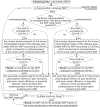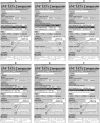Natural Selection Equally Supports the Human Tendencies in Subordination and Domination: A Genome-Wide Study With in silico Confirmation and in vivo Validation in Mice
- PMID: 30873204
- PMCID: PMC6404730
- DOI: 10.3389/fgene.2019.00073
Natural Selection Equally Supports the Human Tendencies in Subordination and Domination: A Genome-Wide Study With in silico Confirmation and in vivo Validation in Mice
Abstract
We proposed the following heuristic decision-making rule: "IF {an excess of a protein relating to the nervous system is an experimentally known physiological marker of low pain sensitivity, fast postinjury recovery, or aggressive, risk/novelty-seeking, anesthetic-like, or similar agonistic-intolerant behavior} AND IF {a single nucleotide polymorphism (SNP) causes overexpression of the gene encoding this protein} THEN {this SNP can be a SNP marker of the tendency in dominance} WHILE {underexpression corresponds to subordination} AND vice versa." Using this decision-making rule, we analyzed 231 human genes of neuropeptidergic, non-neuropeptidergic, and neurotrophinergic systems that encode neurotrophic and growth factors, interleukins, neurotransmitters, receptors, transporters, and enzymes. These proteins are known as key factors of human social behavior. We analyzed all the 5,052 SNPs within the 70 bp promoter region upstream of the position where the protein-coding transcript starts, which were retrieved from databases Ensembl and dbSNP using our previously created public Web service SNP_TATA_Comparator (http://beehive.bionet.nsc.ru/cgi-bin/mgs/tatascan/start.pl). This definition of the promoter region includes all TATA-binding protein (TBP)-binding sites. A total of 556 and 552 candidate SNP markers contributing to the dominance and the subordination, respectively, were uncovered. On this basis, we determined that 231 human genes under study are subject to natural selection against underexpression (significance p < 0.0005), which equally supports the human tendencies in domination and subordination such as the norm of a reaction (plasticity) of the human social hierarchy. These findings explain vertical transmission of domination and subordination traits previously observed in rodent models. Thus, the results of this study equally support both sides of the century-old unsettled scientific debate on whether both aggressiveness and the social hierarchy among humans are inherited (as suggested by Freud and Lorenz) or are due to non-genetic social education, when the children are influenced by older individuals across generations (as proposed by Berkowitz and Fromm).
Keywords: SNP; TATA-box; TBP; candidate SNP marker; expression change; gene; promoter; social hierarchy.
Figures




Similar articles
-
Candidate SNP Markers of Atherogenesis Significantly Shifting the Affinity of TATA-Binding Protein for Human Gene Promoters show stabilizing Natural Selection as a Sum of Neutral Drift Accelerating Atherogenesis and Directional Natural Selection Slowing It.Int J Mol Sci. 2020 Feb 5;21(3):1045. doi: 10.3390/ijms21031045. Int J Mol Sci. 2020. PMID: 32033288 Free PMC article.
-
Disruptive natural selection by male reproductive potential prevents underexpression of protein-coding genes on the human Y chromosome as a self-domestication syndrome.BMC Genet. 2020 Oct 22;21(Suppl 1):89. doi: 10.1186/s12863-020-00896-6. BMC Genet. 2020. PMID: 33092533 Free PMC article.
-
[Hypothetical SNP Markers That Significantly Affect the Affinity of the TATA-Binding Protein to VEGFA, ERBB2, IGF1R, FLT1, KDR, and MET Oncogene Promoters as Chemotherapy Targets].Mol Biol (Mosk). 2016 Jan-Feb;50(1):161-73. doi: 10.7868/S0026898416010201. Mol Biol (Mosk). 2016. PMID: 27028822 Russian.
-
[TATA box polymorphisms in genes of commercial and laboratory animals and plants associated with selectively valuable traits].Genetika. 2010 Apr;46(4):448-57. Genetika. 2010. PMID: 20536014 Review. Russian.
-
[Posttraumatic stress disorder (PTSD) as a consequence of the interaction between an individual genetic susceptibility, a traumatogenic event and a social context].Encephale. 2012 Oct;38(5):373-80. doi: 10.1016/j.encep.2011.12.003. Epub 2012 Jan 24. Encephale. 2012. PMID: 23062450 Review. French.
Cited by
-
A Bioinformatics Model of Human Diseases on the Basis of Differentially Expressed Genes (of Domestic Versus Wild Animals) That Are Orthologs of Human Genes Associated with Reproductive-Potential Changes.Int J Mol Sci. 2021 Feb 26;22(5):2346. doi: 10.3390/ijms22052346. Int J Mol Sci. 2021. PMID: 33652917 Free PMC article.
-
A Rat Model of Human Behavior Provides Evidence of Natural Selection Against Underexpression of Aggressiveness-Related Genes in Humans.Front Genet. 2019 Dec 13;10:1267. doi: 10.3389/fgene.2019.01267. eCollection 2019. Front Genet. 2019. PMID: 31921305 Free PMC article.
-
Candidate SNP Markers of Atherogenesis Significantly Shifting the Affinity of TATA-Binding Protein for Human Gene Promoters show stabilizing Natural Selection as a Sum of Neutral Drift Accelerating Atherogenesis and Directional Natural Selection Slowing It.Int J Mol Sci. 2020 Feb 5;21(3):1045. doi: 10.3390/ijms21031045. Int J Mol Sci. 2020. PMID: 32033288 Free PMC article.
-
Candidate SNP Markers Significantly Altering the Affinity of TATA-Binding Protein for the Promoters of Human Hub Genes for Atherogenesis, Atherosclerosis and Atheroprotection.Int J Mol Sci. 2023 May 19;24(10):9010. doi: 10.3390/ijms24109010. Int J Mol Sci. 2023. PMID: 37240358 Free PMC article.
-
Disruptive Selection of Human Immunostimulatory and Immunosuppressive Genes Both Provokes and Prevents Rheumatoid Arthritis, Respectively, as a Self-Domestication Syndrome.Front Genet. 2021 Jun 22;12:610774. doi: 10.3389/fgene.2021.610774. eCollection 2021. Front Genet. 2021. PMID: 34239535 Free PMC article.
References
-
- Angelov S. N., Hu J. H., Wei H., Airhart N., Shi M., Dichek D. A. (2017). TGF-β (Transforming Growth Factor-β) signaling protects the thoracic and abdominal aorta from angiotensin II-induced pathology by distinct mechanisms. Arterioscler. Thromb. Vasc. Biol. 37 2102–2113. 10.1161/atvbaha.117.309401 - DOI - PMC - PubMed
LinkOut - more resources
Full Text Sources
Miscellaneous

